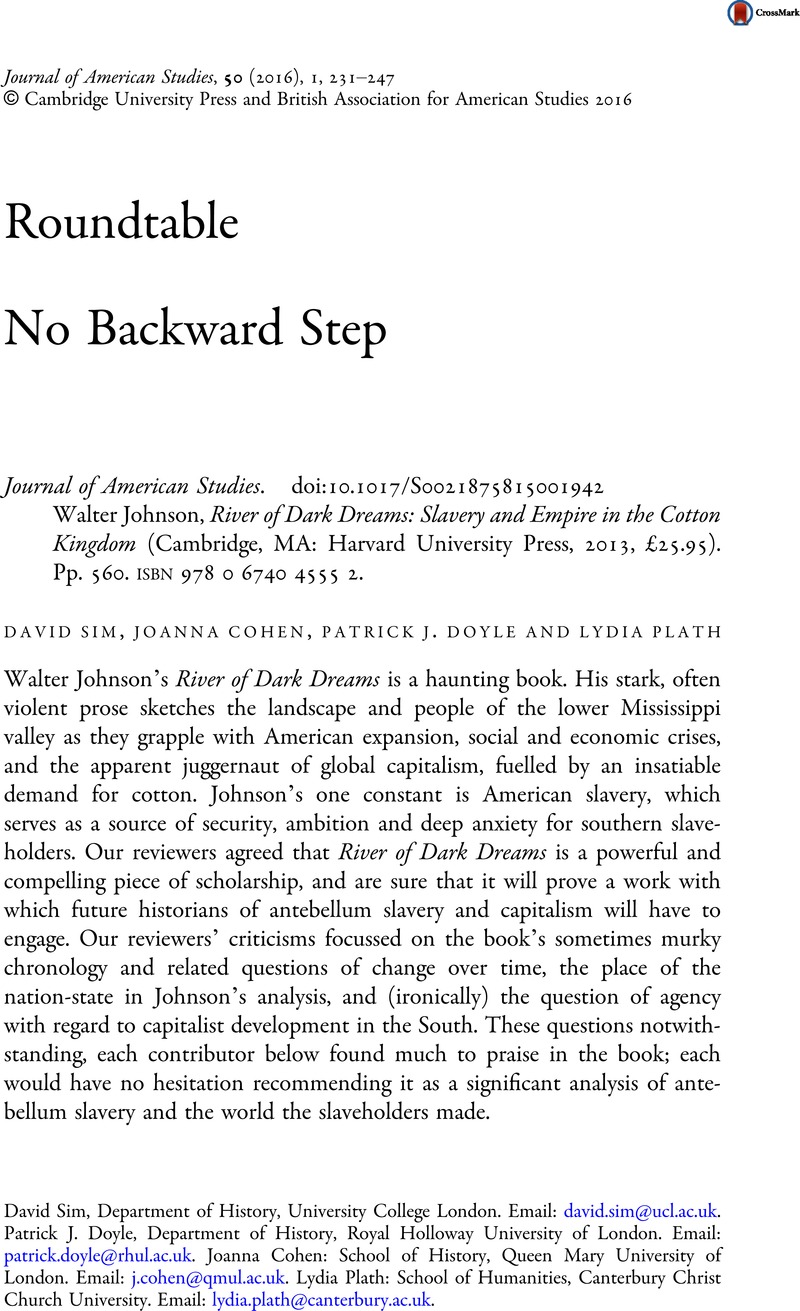No CrossRef data available.
Published online by Cambridge University Press: 01 February 2016

1 For criticism of abstraction in Johnson's writing see Philip Morgan's review of this book in the American Historical Review, 119, 2 (2014), 464Google Scholar.
2 For example, see William Dusinberre's Strategies for Survival: Recollections of Bondage in Antebellum Virginia (Charlottesville: University of Virginia Press, 2009); Jeff Forret's Race Relations at the Margins: Slaves and Poor Whites in the Antebellum Southern Countryside (Baton Rouge: Louisiana University Press, 2006).
3 Edward E. Baptist, Creating an Old South: Middle Florida's Plantation Frontier before the Civil War (Chapel Hill: University of North Carolina Press, 2002).
4 See, for example, Joshua Rothman, Flush Times and Fever Dreams: A Story of Capitalism and Slavery in the Age of Jackson (Athens: University of Georgia Press, 2012); Michael Wayne, Death of an Overseer: Reopening a Murder Investigation from the Plantation South (Oxford: Oxford University Press, 2001); and Lydia J. Plath, “Performances of Honour: Manhood and Violence in the Mississippi Slave Insurrection Scare of 1835,” PhD diss., University of Warwick, 2009.
5 Brian Schoen, The Fragile Fabric of Union: Cotton, Federal Politics, and the Global Origins of the Civil War (Baltimore: Johns Hopkins University Press, 2011), 7–8.
6 Ibid., 7.
7 Richard Follett, The Sugar Masters: Planters and Slaves in Louisiana's Cane World 1820–1860 (Baton Rouge: Louisiana State University Press, 2005).
8 Ibid., 5.
9 Johnson writes more extensively about paternalism in Soul by Soul: Life Inside the Antebellum Slave Market (Cambridge, MA: Harvard University Press, 2000), esp. 19–44; and “A Nettlesome Classic Turns Twenty-Five,” Common-Place, 1, 4 (July 2001)Google Scholar, at www.common-place.org/vol-01/no-04/reviews/johnson.shtml, accessed 17 Nov. 2014.
10 Johnson, Soul by Soul, 111.
11 Michael Tadman, Speculators and Slaves: Masters, Traders, and Slaves in the Old South (Madison: University of Wisconsin Press, 1996), xix–xxxvii; Tadman, “Class and the Construction of ‘Race’: White Racism in the American South,” in Melvyn Stokes, ed., The State of U.S. History (Oxford: Berg, 2002), 332–35; and Lacy K. Ford, Deliver Us from Evil: The Slavery Question in the Old South, 1787–1840 (New York and Oxford: Oxford University Press, 2009), 143–298.
12 Johnson, Soul by Soul, 8, 17, 162–88.
13 Eugene Genovese, Roll, Jordan, Roll: The World the Slaves Made (New York: Pantheon Books, 1974); Genovese, The Political Economy of Slavery: Studies in the Economy and Society of the Slave South (Middletown, CT: Weslyan University Press, 1989).
14 Genovese, Roll, Jordan, Roll, 597–98, 659, on prepolitical/apolitical/accommodationist resistance. Johnson, River of Dark Dreams, 214. See also Johnson, Walter, “On Agency,” Journal of Social History, 37, 1 (Fall 2003), 113–24CrossRefGoogle Scholar.
15 Harris, J. William, ‘Eugene Genovese's Old South: A Review Essay’, Journal of Southern History, 80, 2 (May 2014), 356, 360Google Scholar.
16 Brown, David, “A Vagabond's Tale: Poor Whites, Herrenvolk Democracy, and the Value of Whiteness in the Late Antebellum South,” Journal of Southern History, 79, 4 (Nov. 2013), 799–840Google Scholar.
17 Stephanie McCurry, Masters of Small Worlds: Yeoman Households, Gender Relations, and the Political Culture of the Antebellum South Carolina Low Country (New York: Oxford University Press, 1995).
18 Nicholas Draper, The Price of Emancpiation: Slave-Ownership, Compensation and British Society at the End of Slavery (Cambridge: Cambridge University Press, 2014); Catherine Hall, Nicholas Draper, Keith McClelland, Katie Donington and Rachel Lang, Legacies of British Slave-Ownership: Colonial Slavery and the Formation of Victorian Britain (Cambridge: Cambridge University Press, 2014).
19 Gabriel Winant, “Slave Capitalism,” n+1, 17, at https://nplusonemag.com/issue-17/reviews/slave-capitalism, accessed 17 Nov. 2014.
20 See, for instance, William Davies, The Limits of Neoliberalism: Authority, Sovereignty and the Logic of Competition (Los Angeles: Sage, 2014).
21 See, for instance, Thomas Bender, A Nation among Nations: America's Place in World History (New York: Hill & Wang, 2006), 3–14; and Ian Tyrrell, Transnational Nation: United States History in Global Perspective since 1789 (Basingstoke: Palgrave Macmillan, 2007), 3–4.
22 Thomas Morris quoted in Eric Foner, Free Soil, Free Labor, Free Men: The Ideology of the Republican Party before the Civil War (New York and Oxford: Oxford University Press, 1995), 91.
23 “Death of General John A. Quitman,” New York Times, 19 July 1858.
24 Robert E. May, Manifest Destiny's Underworld: Filibustering in Antebellum America (Chapel Hill and London: University of North Carolina Press, 2002), esp. 249–67.
25 Henry Stuart Foote, Casket of Reminiscences (Washington, DC: Chronicle Publishing Company, 1874).
26 Rebecca Scott, Degrees of Freedom: Louisiana and Cuba after Slavery (Cambridge, MA: Harvard University Press, 2005); and Scott, Slave Emancipation in Cuba: The Transition to Free Labor, 1860–1899 (Princeton, NJ: Princeton University Press, 1985); Matthew Pratt Guterl, American Mediterranean: Southern Slaveholders in the Age of Emancipation (Cambridge, MA: Harvard University Press, 2008).
27 Sven Beckert, Empire of Cotton: A New History of Global Capitalism (London: Allen Lane, 2014).
28 L. Diane Barnes, Brian Schoen and Frank Towers, eds., The Old South's Modern Worlds: Slavery, Region, and Nation in the Age of Progress (2011), 314.